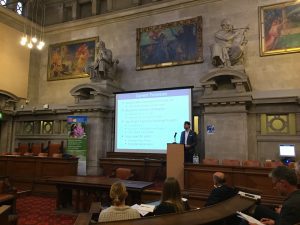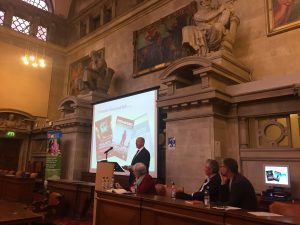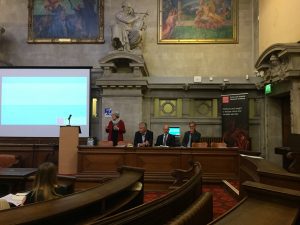In celebration of World Oceans Day, the SAFESEAS team in collaboration with the Sustainable Places Research Institute and the Crime and Security Research Institute at Cardiff University held a seminar on the 8th of June with the aim of exploring linkages between some of the key challenges facing the ocean space. This blog summarises the key insights gained at the event.
The afternoon seminar brought together speakers with expertise in maritime affairs and socio-ecological policy from Cardiff University and beyond. Through a series of presentations and debate, the seminar explored some of the key challenges of achieving the aims of SDG 14 including maritime security, ecology and food security. Discussion focussed primarily around the link between social, ecological and economic development in island and coastal communities.
 The first part of the seminar focussed on Law Enforcement at Sea. Professor Tim Edmunds, University of Bristol and Co-Investigator of the Safe Seas project, highlighted the challenges of ocean governance and maritime security. He emphasised the need to develop more holistic forms of maritime governance and more inclusive forms of maritime governance. Capacity building and coalitions of interest were flagged as mechanisms supporting more inclusive forms of maritime governance.
The first part of the seminar focussed on Law Enforcement at Sea. Professor Tim Edmunds, University of Bristol and Co-Investigator of the Safe Seas project, highlighted the challenges of ocean governance and maritime security. He emphasised the need to develop more holistic forms of maritime governance and more inclusive forms of maritime governance. Capacity building and coalitions of interest were flagged as mechanisms supporting more inclusive forms of maritime governance.
The ontological challenge of governing ocean space was explored by Dr Barry Ryan of Keele University. Ryan suggested ocean space has become ultimately defined by those who police it and questioned how it could be governed more democratically. He suggested that more participatory forms of governance at the micro-hydro scale are necessary so that the sea can ultimately be viewed and used as a public space.
 Peter Horn of The Pew Charitable Trusts gave some practical insight to the challenges of maritime governance, discussing the work of the foundation to address fishery crimes. He emphasized that fishery crimes are not just about fish, but often linked to other illegal activities – including human trafficking, corruption and evasion of penalties – which make it a particularly complex and urgent issue to address.
Peter Horn of The Pew Charitable Trusts gave some practical insight to the challenges of maritime governance, discussing the work of the foundation to address fishery crimes. He emphasized that fishery crimes are not just about fish, but often linked to other illegal activities – including human trafficking, corruption and evasion of penalties – which make it a particularly complex and urgent issue to address.
The session provoked thinking around ways in which the governance of maritime space may be approached both ontologically and politically in a more sustainable fashion in order to meet the SD Goals 14. In the Q&A session, participants highlighted the complexity of land-sea jurisdictions and how surveillance technology at sea can be both enabling and constraining. Others questioned the need to aim for security and asked whether beginning from the point of insecurity is more helpful. Such a viewpoint considers the complex ways in which communities are affected by security measures, often in ways not necessarily enhancing livelihoods or well-being.
The second panel, explored sustainable development issues and the ocean in the light of SDG 14. Professor Susan Baker opened the second session with a discussion of issues faced by Small Island Developing States using marine resource dependency in the Seychelles as an illustrative example. She explored issues such as concerns over the security of food and nutrition, water, energy and the link to maritime crime. Baker identified challenges of building capacity for effective management of marine resources and highlighted that security discourse has evolved from military defence but also practices of social protection in welfare state regimes.
 Dr Leanne Cullen-Unsworth then took proceedings to a micro-level with a focus on securing a sustainable future for seagrass meadows, which constitutes a fundamental, yet ‘hidden’ element of global fisheries production. Cullen-Unsworth highlighted the role of seagrass meadows for concerns over food security and argued for better understanding of the interface between marine biodiversity conservation and socio-economic activities. Seagrass, as a habitat and ecosystem for fish, illustrates to some degree the cyclical and interconnected nature of maritime security and development.
Dr Leanne Cullen-Unsworth then took proceedings to a micro-level with a focus on securing a sustainable future for seagrass meadows, which constitutes a fundamental, yet ‘hidden’ element of global fisheries production. Cullen-Unsworth highlighted the role of seagrass meadows for concerns over food security and argued for better understanding of the interface between marine biodiversity conservation and socio-economic activities. Seagrass, as a habitat and ecosystem for fish, illustrates to some degree the cyclical and interconnected nature of maritime security and development.
Finally, Dr Jessica Paddock (Sustainable Consumption Institute, Manchester University) presented on marine resources for sustainable development within SDG14. This presentation explored ideas around conservation and sustainable use of the ocean and marine resources to promote access to affordable and appropriate food. She highlighted how food security is not simply an issue of ‘supply’, but supply of the right kinds of food for human wellbeing including affordable, culturally appropriate food. Paddock used the Turks and Caicos Islands as illustrative examples of the negative impacts of illegal activity in terms of food quality, access and appropriateness on SIDs.
The Q&A session participants discussed the costs and benefits of framing development challenges such as malnutrition in the language of security. The importance of education – in contrast to law enforcement responses – was discussed, but it was cautioned that soft tools approaches alone are not sufficient – institutions must also be involved in nurturing local buy in and building capacities. Participants agreed that the inter-linkages between security and development and in particular the trade-offs between pursuing several issue-specific agendas simultaneously require further attention.

1 thought on “Development, Security and the Oceans: Summary of World Oceans Day event”